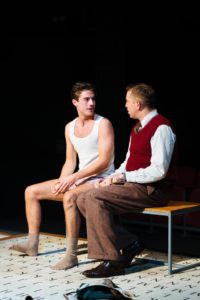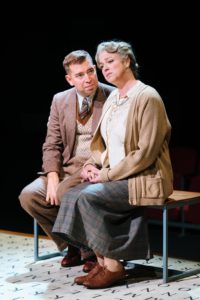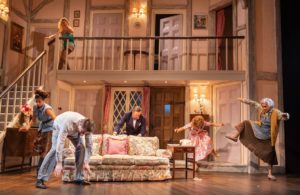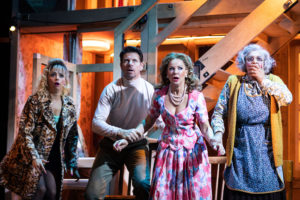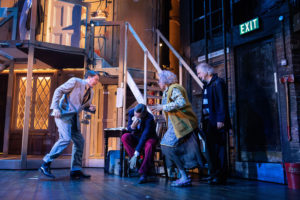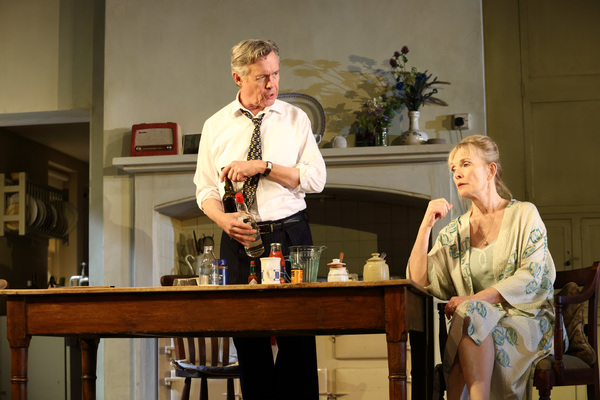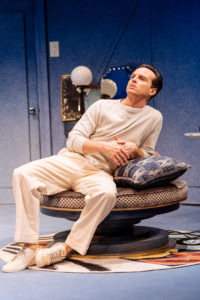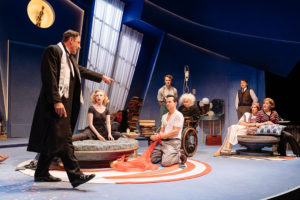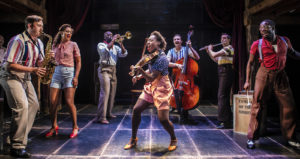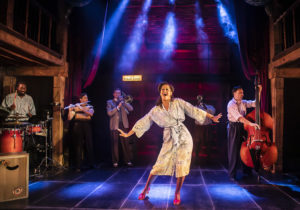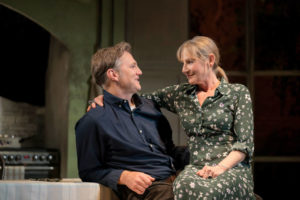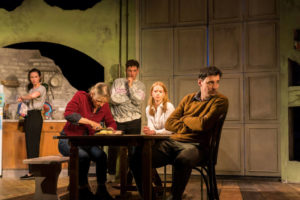Barney Norris brings home the power of love
★★★
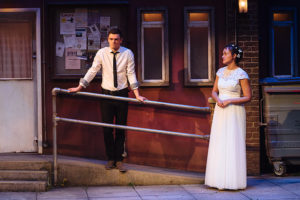
Wiltshire becomes a metaphor for today’s Britain in Barney Norris‘ retelling of Lorca’s Blood Wedding at Salisbury Playhouse. The blood feud of the original is replaced by laddish drunkenness and Mediterranean passion by English reticence in which ‘Sorry’ is the most used word.
That may sound like Lorca-lite but this is a good play in its own right. The characters are well drawn and the dialogue feels real. That’s partly because it is so strongly rooted in Wiltshire. There is longing, fate and disconnection in this story of an ill matched bride and groom whose tragic fate is sealed when another man stirs the bride’s heart.
What works particularly well in Alice Hamilton’s production is the feeling that these characters are trapped. They are limited by poverty. None has moved far over the years, yet they are all slightly displaced from their origins. This combination of roots and disconnection is a powerful parable for our times: England has one foot in the past while being uncertain how to step into the future; we still have bigotry but as it says in the play ‘bigot’ is now a pejorative term.
They are even trapped in an unchanging set- a beautifully constructed exterior of a once proud community hall now dilapidated. Sitting in Salisbury, watching a play so rooted in Wiltshire, adds to that feeling of being trapped.
The atmosphere of the Moonraker county is strong but the story of Lorca’s Blood Wedding is universal.
As in the original, we have a Bride and Groom. Georgie is about to marry Rob, for whom the title ‘lad’ might have been invented. He’s a four years younger than her but seems like a different generation, such is his childishness. He’s infatuated with her; she just wants to get married.
Georgie and Rob are played by very promising young actors. Reece Evans’ goofy expressions, loud jokes and wide-eyed innocence are just the right side of caricature. Lily Nichol conveys Georgie’s discomfort with the situation as if it were a physical burden.
When she meets her old flame Lee, whom she previously rejected because he’s an Irish traveller, her feeling that real love is missing from her current relationship is crystallised. Both feel, as he says, there must be more to life. After the interval, it’s time for the wedding reception and an inevitable catastrophe.
Lee too has a loveless marriage with Georgie’s old school friend Danni, now the mother of Lee’s child and pregnant again. There is a deeply moving moment when Danni, continually asking him whether he loves her, says with sadness, ‘If you did, I wouldn’t be talking now.’
An impressive look at the complex lives of ordinary people
Tensions mount until the situation explodes but, in keeping with the original, the ‘blood’ of the blood wedding is shed offstage. Although, at this point in the production, the use of a kind of one man Greek chorus high up is undoubtedly dramatic, I found it too histrionic for this tale of ordinary people. I would have preferred the description of what has happened and the explanation of its significance to have been contained within the natural conversations. In other words, show rather than tell.
The set, designed by James Perkins, is crowned by a huge moon, another Lorca reference, that underlines the feeling that there are greater forces that control the fate of mere humans.
The rest of the cast shine. Jeff Rawle plays the hall’s caretaker Brian with a white beard and a benign smile that give him a Father Christmas look as he dispenses sage advice. A perfect choice for the part. Teresa Banham is totally believable as Rob’s edgy, sensitive mother. Emmet Byrne convinces as the spirited but nervous traveller desperate to be free who sparks passion in Georgie. The confusion and desperation Eleanor Henderson beings to the role of Lee’s wife Danni is touching.
It may lack Lorca’s passion but Barney Norris‘ version of Blood Wedding is an impressive look at the complex lives of ordinary people in Britain today.
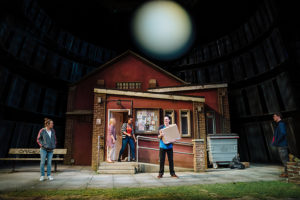
Lorca’s Blood Wedding is performing at Salisbury playhouse until 22 February 2020. Tickets from Salisbury Playhouse
[This review was edited on 15 February 2020: the order of some of the text was rearranged to make it more coherent.]
Paul was given a review ticket by Salisbury Playhouse.


